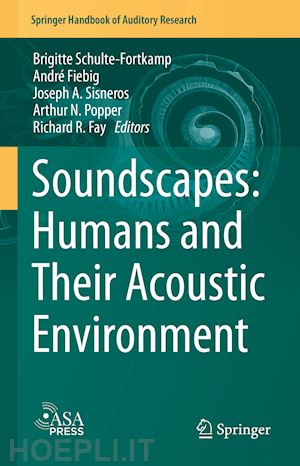
Questo prodotto usufruisce delle SPEDIZIONI GRATIS
selezionando l'opzione Corriere Veloce in fase di ordine.
Pagabile anche con Carta della cultura giovani e del merito, 18App Bonus Cultura e Carta del Docente
The concept of the “Soundscapes” includes all of the sounds in one’s environment and focuses not only on the sounds itself. Instead, it focuses on the interrelationships between person and activity and place, both in space and time. Soundscape also include influences on the acoustic environment through auditory sensation, its interpretation, and the responses to the acoustic environment in context. The conceptual framework of Soundscape describes the “process of perceiving or experiencing and/or understanding an acoustic environment, highlighting general concepts and their relationships: context, sound sources, acoustic environment, auditory sensation, interpretation of auditory sensation, responses, and outcomes” (International Organization for Standardization, ISO 12913-1:2014 Acoustics Soundscape Part Definition and Conceptual Framework, ISO, Geneva, 2014).
With soundscape, one achieves a deeper understanding of acoustic environment and its effects on people. The ISOstandard 12931-1 on soundscape provides an important, and rigorous, distinction in the use of “Soundscape.” But, it is recognizable that some individuals, particularly planners, designers, lay persons, and even those primarily interested in management of the acoustic environment through environmental noise control, will find it convenient to use “Soundscape” as a synonym for the physical acoustic environment.
When it comes to noise management and urban planning, soundscape research has the potential to promote healthy urban environments by sharing and incorporating the significant knowledge of all concerned parties. Understandably, this shows that the communication with regard to noise management has to be forced to guarantee that the specifics of Soundscapes (i.e., the relevance of perception) are seriously considered alongside the whole.
This book will bridge the gap between soundscape theory and practice and therefore it will be different from our earlierpublications as “Soundscape and the built environment” (ed. by J. Kang and B. Schulte-Fortkamp CRC Press, Taylor and Francis Group, Boca Raton, Fl 2016) and also from the respective Special Issues on Soundscapes in 2012 in The Journal of the Acoustical Society of America (ed. by B. Schulte-Fortkamp and J. Kang), and also the Special Issue in Acta Acustica 2006 *(ed. by B. Schulte-Fortkamp and D. Dubois), and the E-book on soundscape
This volume will be driven by the difficult process of standardization of Soundscape and its evaluation procedures. The main goal of the proposed volume is to present and review the developments in Soundscape, reflecting the standardization procedure and the diverse inputs. the needs in management and planning in urban acoustic environments, the book will also focus on the difficulties, as well as the solutions, in interdisciplinary grounded communication, that is, on the one hand, related to science, but on the other to application, that needs guidance.
Dr. Brigitte Schulte-Fortkamp is Professor (retired) in Psychoacoustics, Noise- Effects, and Soundscape at the Technical University Berlin, Germany.
Dr. Joseph A. Sisneros is Professor in the Department of Psychology at the University of Washington, Seattle, USA.
Dr. André Fiebig is Professor in the Department of Engineering Acoustics at the Technical University Berlin, Germany.
Dr. Richard R. Fay was Distinguished Research Professor of Psychology at Loyola University, Chicago.
Dr. Arthur N. Popper is Professor Emeritus and Research Professor in the Department of Biology at the University of Maryland, College Park.











Il sito utilizza cookie ed altri strumenti di tracciamento che raccolgono informazioni dal dispositivo dell’utente. Oltre ai cookie tecnici ed analitici aggregati, strettamente necessari per il funzionamento di questo sito web, previo consenso dell’utente possono essere installati cookie di profilazione e marketing e cookie dei social media. Cliccando su “Accetto tutti i cookie” saranno attivate tutte le categorie di cookie. Per accettare solo deterninate categorie di cookie, cliccare invece su “Impostazioni cookie”. Chiudendo il banner o continuando a navigare saranno installati solo cookie tecnici. Per maggiori dettagli, consultare la Cookie Policy.